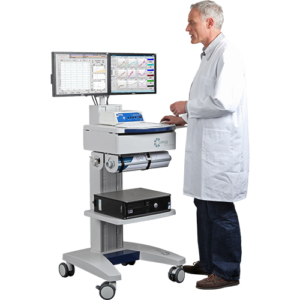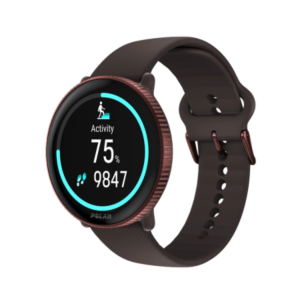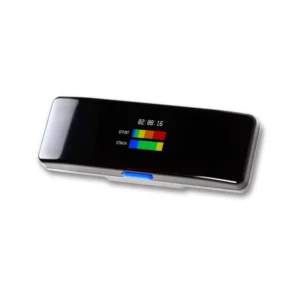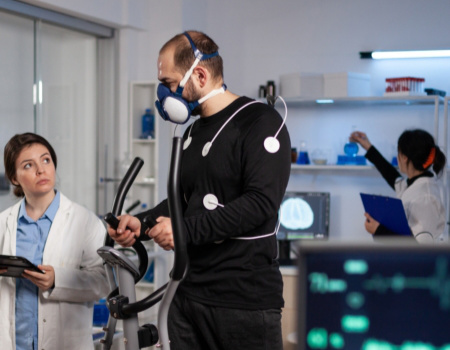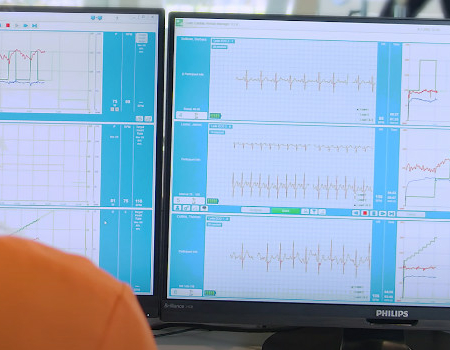Knowledge Hub
Heart Health Monitoring: Benefits, Applications & Methods
Heart health monitoring has garnered significant attention in recent years, with advancements in technology enabling the development of devices and applications aimed at tracking and improving cardiovascular health.
With 1 in 13 thought to be suffering from heart disease globally, the role of cardiovascular measurement equipment in managing heart health has become increasingly crucial to public health.
This article will delve into the intricacies of heart health activity monitoring, examining its potential benefits, applications in various sectors and the methods employed to facilitate comprehensive monitoring.
What is Heart Health Monitoring?
Cardiac health activity monitoring involves the continuous or intermittent assessment of a patient's heart activity, particularly focusing on their cardiac rhythm, to evaluate their overall heart health. This monitoring is typically carried out using electrocardiography, a non-invasive process that records the heart's electrical activity and displays it in an electrocardiogram.
The objective of this monitoring is to assess the patient's cardiac rhythm and detect any irregularities or abnormalities that may indicate potential heart health issues. By continuously monitoring the patient's heart activity, healthcare professionals can gain valuable insights into the patient's cardiovascular health, identify any potential concerns and make informed decisions regarding their treatment and care.
The monitoring process may involve the use of various devices, such as loop memory monitors, symptom event monitors, patch recorders or implanted loop recorders, depending on the specific needs and conditions of the patient.
Benefits of Heart Health Monitoring
Regular monitoring of heart health activity provides valuable insights into an individual's cardiovascular well-being and facilitates proactive management of potential cardiac risks. By tracking heart health activity, individuals can gain a deeper understanding of their overall cardiovascular health and make informed decisions to mitigate potential risks.
This monitoring allows for the early detection of irregularities or concerning patterns, enabling timely intervention and preventive measures. Additionally, it empowers individuals to assess the impact of their lifestyle choices on their heart health and make necessary adjustments to promote overall well-being.
Furthermore, heart health activity monitoring can contribute to improved adherence to prescribed treatment plans and lifestyle modifications, thereby enhancing the effectiveness of cardiovascular care. It also serves as a motivational tool, encouraging individuals to engage in physical activity, adopt healthier dietary habits and manage stress more effectively.
Ultimately, the insights gained from consistent heart health activity monitoring can lead to better long-term outcomes and a reduced risk of cardiovascular events, contributing to overall health and quality of life.
Applications in Various Sectors
The use of a heart health monitor and mobile applications has broad applications across various sectors. These sectors include medical rehabilitation, health and fitness, professional sports and academic settings.
Medical Rehabilitation
Rehabilitation programs in various medical sectors utilise advanced technology for monitoring patients' progress and customising their treatment plans.
In the field of cardiac rehabilitation, the use of cardiovascular measuring devices and mobile applications has shown promising results in improving the physical activity and health outcomes of patients with cardiovascular disease.
Research indicates significant improvements in physical activity levels and a decrease in the risk of rehospitalization among patients undergoing cardiac rehab management.
Health & Fitness
In health and fitness, advancements in technology have paved the way for personalised fitness tracking and goal setting, showing promising potential for enhancing the overall well-being of individuals undergoing various medical rehabilitation programs.
The use of activity-monitoring devices and mobile applications has proven effective in increasing physical activity and reducing sedentariness.
Analyses have reported significant improvements in physical activity levels and positive changes in behavioural outcomes such as smoking behaviour and diet quality intake.
Professional Sports
Professional sports organisations and their associated sectors increasingly rely on advanced technology and data-driven approaches to optimise performance and prevent injuries.
In various professional sports, the use of heart activity-monitoring devices and mobile applications has demonstrated significant potential. Since the 1960s, the use of these devices have proven to be instrumental in improving the overall well-being and performance of athletes and is a key tool in monitoring physiological load.
Academic
The use of activity-monitoring devices in academic settings provides students and researchers with practical, real-time data collection and analysis, enhancing their understanding of heart health and physical activity. These applications enable students to engage in hands-on learning experiences, promoting a deeper comprehension of the impact of physical activity on cardiovascular health.
Furthermore, academic institutions can utilise these technologies to conduct research and studies on heart health, contributing to the advancement of knowledge in the field of cardiology and promoting evidence-based practices in healthcare.
Methods for Heart Health Monitoring
The main method for heart health activity monitoring is the use of ECG (Electrocardiogram) monitors. These devices are capable of recording the electrical activity of the heart over a period of time, providing detailed information about the heart's rhythm and detecting any irregularities.
ECG monitors are commonly used in clinical settings, but recent advancements have led to the development of portable ECG monitors that can be worn discreetly for continuous monitoring outside of a hospital or clinic.
Professional ECG Monitors
Electrocardiograms are widely used for heart health activity monitoring in professional setting such as hospitals and academic or sports research. ECG monitors are essential for continuously monitoring the electrical activity of the heart, enabling healthcare professionals to assess heart health and detect any abnormalities. These monitors are crucial in diagnosing and managing various cardiac conditions, including arrhythmias, heart attacks and conducting cardiac rehab.
Many professional ECG monitoring solutions are equipped with advanced features such as real-time ECG waveform display, heart rate analysis and alarm systems to alert healthcare providers of any irregularities. Additionally, modern ECG monitors often integrate with software and digital ECG systems, allowing seamless data transfer and analysis to support clinical decision-making.
Smart Watches
Smart watches offer individuals the ability to track their heart health in real-time and can also integrate with smartphone apps, allowing users to easily access and share their ECG data with healthcare professionals for further analysis and guidance.
Smart watches equipped with heart rate monitors, accelerometers and GPS technology can track steps, distance and heart rate, providing users with a comprehensive overview of their daily activity levels. These devices also offer features such as continuous heart rate monitoring, sleep tracking and even stress management tools.
Chest Strap Heart Monitors
Chest strap heart rate monitors combine the latest personal ECG technology with ergonomic design to deliver in-depth and real-time feedback on heart health. They are typically lightweight and attached to an elasticated, adjustable chest belt, allowing for a secure and comfortable fit during various activities.
Modern chest heart rate monitors such as the Frontier X2 and Polar H10 can accurately record and analyse various metrics related to heart health, such as heart rate, heart rhythm, heart strain and HRV (heart rate variability). Like smart watches, they offer the convenience of connectivity options, including Bluetooth and compatibility with iOS and Android, enabling seamless integration with a wide range of devices.
The Importance of Heart Health Monitoring
Heart health activity monitoring is now a widely accessible resource, benefitting people’s fitness in both domestic and professional settings. The advent of smart watches, alongside more bespoke heart activity monitors, mean that everyone can harness ECG data to whatever extent they require.
The wealth of monitoring solutions is particularly exciting given the amount of research indicating that proper monitoring of heart health can lead to widespread benefits, including improvements in physical activity and lifestyle, as well a decrease in rehospitalization for those who have suffered a cardiac event.
Speak to the experts
Got a question about heart monitors?
